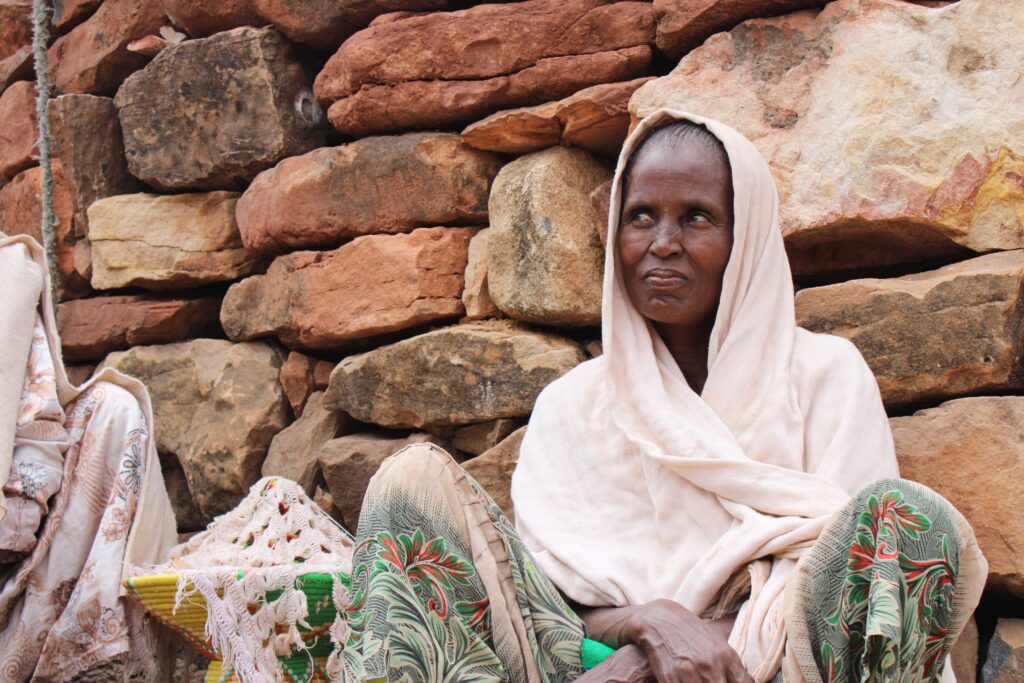By Molly St. Clair, Western Kentucky University senior journalism student
On the porch of the Tigray Hamlin Fistula Hospital two women sat chatting and wrapped in beautiful, knit blankets. Blankets they made during their month-long stay at the hospital preparing for their life-changing procedure.
The Hospital provides fellowship, healing and guidance for women who have suffered one of the most horrific conditions resulting from childbirth. Without clean water, none of it would be possible.

Medical gloves hanging to dry outside the Tigray Hamlin Obstetric Fistula Hospital after being cleaned for reuse. Preservation of resources allows the hospital to help as many women as possible.
Obstetric Fistula is one of the worst injuries a woman can suffer from childbirth. Obstetric Fistula occurs due to prolonged labor without proper medical care, resulting in a hole between the birth canal, bladder and/or rectum. Women with this condition will have leakage of discharge, urine or stool. Additional contributors to causes of obstetric fistula is the mother being too young to have a child or harmful cultural practices.
Not only do women who suffer from Obstetric Fistula have endured several days long labor without proper care, but 93% of them give birth to a still born baby. To follow this trauma and pain, women with Obstetric Fistula are often ostracized from society because they are considered “unclean”. Their husbands don’t want them anymore or the family disowns them. Some women live with obstetric Fistula for 50 years before finding help.
Under the guidance of the late Catherine Hamlin, Dr. Melkmelaku has devoted much of his life to repairing obstetric fistulas and helping women in the Tigray area. Melkmelaku believes women are the key to healing, growing and uplifting the world.
Women who attend the Fistula Hospital for treatment not only receive a life changing procedure, but are educated on how to take proper care of themselves.
“When you educate women and girls, you educate the future,” Melkmelaku said.
They learn that they are not unclean, but strong and important. By educating the women about the condition, they can go forward and educate others, ultimately resulting in cultural change and growing compassion for those impacted by Obstetric Fistula
In total, the patients are cared for at the hospital for about one month. They have private grounds to walk on, a fresh garden and companionship with other women experiencing the same condition.
However, outside of the doctors and trained medical staff, the system relies on one main, essential element. Clean Water.
Without clean water, the Fistula Hospital would be unable to properly and safely operate. Without clean water, women continue to suffer from this emotionally, mentally and physically, painful condition.
For those with running, clean water, the importance of clean water is not something that is dwelled on. The impact of clean water and how much it surrounds every moment is a far off thought. For the Obstetric Fistula clinic, clean water is invaluable and crucial.
With clean water, the obstetric fistula hospital is able to operate on 18 women per week. That means 18 women every week with a new life and on a path of healing. 18 women every week who have received new education and can help create cultural change.
The presence of clean water creates a ripple effect that can stretch the length of nations. Clean water holds the ability to heal, educate, and create new beginnings.
“Empowerment of women creates freedom,” Melkamelaku said.
Hamlin and Melkamelaku’s work has the power to affect societal change, just as many other health clinics do, but it all depends on access to clean water.
Vision Trip 2023



About The Author: Jamie Morris
More posts by Jamie Morris